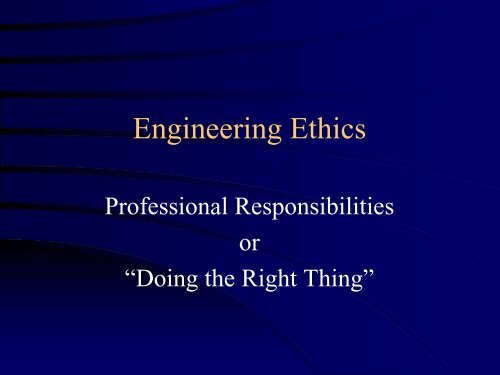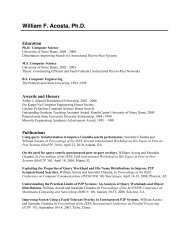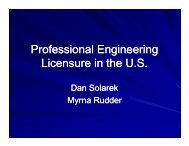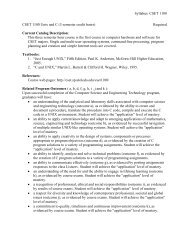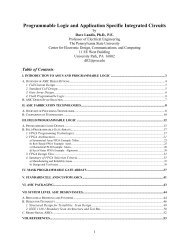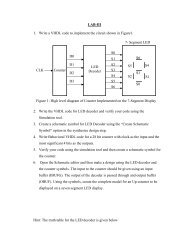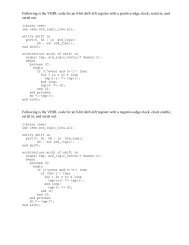engineering ethics - workplace experience - The University of ...
engineering ethics - workplace experience - The University of ...
engineering ethics - workplace experience - The University of ...
You also want an ePaper? Increase the reach of your titles
YUMPU automatically turns print PDFs into web optimized ePapers that Google loves.
Engineering Ethics<br />
Pr<strong>of</strong>essional Responsibilities<br />
or<br />
“Doing the Right Thing”
What is Ethics?
Defining Ethics<br />
Is it ethical? Is it legal? Is it moral?
Defining Ethics<br />
• Ethics (from ancient Greece)<br />
– from the Greek word Éthos which means “the<br />
persuasive appeal <strong>of</strong> one’s character”<br />
– the keyword here is character
Defining Ethics<br />
• Ethics (from Merriam-Webster)<br />
– the discipline dealing with what is good and<br />
bad and with moral duty and – a set <strong>of</strong> moral<br />
principles or values<br />
– a theory or system <strong>of</strong> moral values<br />
– the principles <strong>of</strong> conduct governing an<br />
individual or a group (e.g., pr<strong>of</strong>essional <strong>ethics</strong>)
Defining Ethics<br />
• Ethical (from Merriam-Webster)<br />
– <strong>of</strong> or relating to <strong>ethics</strong><br />
– involving or expressing moral approval or<br />
disapproval<br />
– conforming to accepted pr<strong>of</strong>essional standards<br />
<strong>of</strong> conduct
• Moral<br />
What are Moral Values?<br />
What is Morality?<br />
– <strong>of</strong> or relating to principles <strong>of</strong> right and wrong in behavior,<br />
good and bad behavior<br />
• Morality<br />
– a doctrine <strong>of</strong> system <strong>of</strong> moral conduct<br />
– particular moral principles or rules <strong>of</strong> conduct<br />
– conformity to ideals <strong>of</strong> right human conduct<br />
Ultimately, morality is about reasons centered in<br />
respect for other people as well as ourselves, reasons<br />
that involve their good as well as our own.
Working Definitions<br />
• Ethics<br />
– the rules and ideals for human behavior<br />
– they tell us what we ought to do<br />
• Engineering Ethics<br />
– the rules and ideals <strong>of</strong> the <strong>engineering</strong><br />
pr<strong>of</strong>ession
Meaning <strong>of</strong> Our Definitions<br />
So, what do we mean by Ethics?<br />
• a body <strong>of</strong> moral principles<br />
• a set <strong>of</strong> rules and behaviors<br />
• standards, rules and guidelines<br />
• socially approved conduct<br />
• respect for people and rights<br />
• distinguished from matters <strong>of</strong> legality
• Who decides<br />
Engineering Ethics<br />
– Standards adopted by pr<strong>of</strong>essional community<br />
and established companies<br />
– NSPE, ASME, ASCE, ACM, IEEE, etc.<br />
– May conflict with personal <strong>ethics</strong><br />
• Case studies<br />
– used to set standards<br />
– Provide real-world examples
Service<br />
Social Contract<br />
– Promoting well being <strong>of</strong> general public<br />
– Ensuring competence <strong>of</strong> pr<strong>of</strong>essionals<br />
Self-regulation<br />
– Create and enforce high standards<br />
– Autonomy <strong>of</strong> the pr<strong>of</strong>ession
Moral Reasoning
Ethics and the Law
Ethics and the Law<br />
Illegal &<br />
Ethical<br />
Illegal &<br />
Unethical<br />
Legal &<br />
Ethical<br />
Legal &<br />
Unethical
Developing a Well-Reasoned<br />
Response to a Moral Dilemma<br />
• Moral dilemmas are situations in which two or<br />
more moral obligations, duties, rights, goods,<br />
or ideals come into conflict with one another.<br />
• How does one decide whether a response is<br />
well-reasoned? What criteria apply? Can we<br />
reliably judge?
Developing a Well-Reasoned<br />
Response to a Moral Dilemma<br />
Responses can be judged on these criteria:<br />
1. Whether the response addresses each <strong>of</strong> the issues and points<br />
<strong>of</strong> ethical conflict<br />
2. Whether each interested party’s legitimate expectations are<br />
considered<br />
3. Whether the consequences <strong>of</strong> acting for each party are<br />
recognized and incorporated into the decision<br />
4. Whether each <strong>of</strong> the duties or obligations <strong>of</strong> the participants<br />
are described and based on moral considerations
Why should engineers<br />
have a code <strong>of</strong> <strong>ethics</strong>?
Herbert Hoover (on <strong>engineering</strong>)<br />
31 st President<br />
1929-1933 1929 1933<br />
Mining Engineer<br />
• “<strong>The</strong> great liability <strong>of</strong> the engineer compared to<br />
men <strong>of</strong> other pr<strong>of</strong>essions is that his works are<br />
out in the open where all can see them. His<br />
acts, step by step, are in hard substance. He<br />
cannot bury his mistakes in the grave like the<br />
doctors. He cannot argue them into thin air or<br />
blame the judge like the lawyers… He cannot,<br />
like the politician, screen his shortcomings by<br />
blaming his opponents and hope that the people<br />
will forget. <strong>The</strong> engineer simply cannot deny<br />
that he did it. If his works do not work, he is<br />
damned forever.”
Engineering (past and present)<br />
• Past<br />
– independent craftsman and consultant<br />
– individualism and accountability<br />
– personally identifiable engineer<br />
• Present<br />
– engineer is now less visible to the public<br />
– technology is the domain <strong>of</strong> the “corporation”<br />
– anonymity <strong>of</strong> the Engineer<br />
– focused on serving the organization, not the public
Engineering Code <strong>of</strong> Ethics<br />
• Most pr<strong>of</strong>essional organizations<br />
have addressed the complexity <strong>of</strong><br />
moral issues in their fields by<br />
developing codes <strong>of</strong> <strong>ethics</strong><br />
• Pr<strong>of</strong>essional codes <strong>of</strong> <strong>ethics</strong><br />
consist primarily <strong>of</strong> principles <strong>of</strong><br />
responsibility that delineate how<br />
to promote the public good.
• Shared Standards<br />
Roles <strong>of</strong> Codes<br />
• Positive Support to Act Ethically<br />
• Guidance Concerning Obligations<br />
• Motivation to do the right thing<br />
• Education to help with making hard decisions<br />
• Deterrence and Discipline<br />
• Maintanence <strong>of</strong> Pr<strong>of</strong>essional Image
IEEE Code <strong>of</strong> Ethics<br />
• Introduction and items 1 through 5
IEEE Code <strong>of</strong> Ethics<br />
• Introduction (repeated) and items 6 through 10<br />
http://www.ieee.org/portal/pages/about/whatis/code.html
ACM Code <strong>of</strong> Ethics<br />
• Preamble (excerpts)
ACM Code <strong>of</strong> Ethics<br />
• General Moral Imperatives
ACM Code <strong>of</strong> Ethics<br />
• More Specific Pr<strong>of</strong>essional Responsibilities
ACM Code <strong>of</strong> Ethics<br />
• Organizational Leadership Imperatives
ACM Code <strong>of</strong> Ethics<br />
• Compliance with the Code<br />
http://www.acm.org/constitution/code.html
ASME Code <strong>of</strong> Ethics<br />
• Fundamental Principles
• Canon<br />
– an accepted principle or rule<br />
ASME Code <strong>of</strong> Ethics<br />
– a criterion or standard <strong>of</strong> judgment<br />
– a body <strong>of</strong> principles, rules,<br />
• Fundamental standards Canons or norms
ASME Code <strong>of</strong> Ethics<br />
• Responsibility and Revisions<br />
http://files.asme.org/asmeorg/Governance/3675.pdf
ASCE Code <strong>of</strong> Ethics<br />
• Fundamental Principles
ASCE Code <strong>of</strong> Ethics<br />
• Fundamental Canons
ASCE Code <strong>of</strong> Ethics<br />
• Guidelines to Practice<br />
http://www.asce.org/inside/files/pdf/Code<strong>of</strong>Ethics1.pdf
• Preamble<br />
NSPE Code <strong>of</strong> Ethics
NSPE Code <strong>of</strong> Ethics<br />
• Fundamental Canons
NSPE Code <strong>of</strong> Ethics<br />
• Rules <strong>of</strong> Practice
NSPE Code <strong>of</strong> Ethics<br />
• Pr<strong>of</strong>essional Obligations
NSPE Code <strong>of</strong> Ethics<br />
• Pr<strong>of</strong>essional Obligations (continued)<br />
http://www.nspe.org/<strong>ethics</strong>/eh1-code.asp
Possible Sources <strong>of</strong> Conflict<br />
• Personal integrity vs. corporate loyalty<br />
– business interests such as cost<br />
• Career goals or considerations<br />
• Deadlines<br />
• Insufficient knowledge
Why should you have<br />
a code <strong>of</strong> <strong>ethics</strong>?
<strong>The</strong> Reality Is …<br />
• You will be faced will ethical dilemmas<br />
• <strong>The</strong>y will have serious consequences, either now<br />
or in the future<br />
• If you do the right thing it may go unnoticed,<br />
but…<br />
• If you don’t, your job/career/company/family may<br />
be hurt, along with innocent customers, users, or<br />
other people
• You are pr<strong>of</strong>essional<br />
Remember<br />
• You are a member <strong>of</strong> a pr<strong>of</strong>ession that has<br />
many worthy accomplishments<br />
• You and others in your pr<strong>of</strong>ession can do<br />
much to help to improve the quality <strong>of</strong> life
1.<br />
2.<br />
3.<br />
4.<br />
5.<br />
6.<br />
Ethical Decision Making<br />
Who will be affected by my decision?<br />
What general rules or principles underlie my decision? Are you<br />
handling similar matters consistently?<br />
What are the implications <strong>of</strong> my decision for the <strong>University</strong>, Company<br />
and the public?<br />
What does my decision say about my values? (We all know people who<br />
say one thing & do another.)<br />
One can be unethical without breaking the law.<br />
What is right, what is fair and what is in your best interest may not be<br />
the same. Put your bias aside.
An Example<br />
• You are working on a school project in a<br />
group. One <strong>of</strong> your members refuses to do<br />
his or her part in the project. What do you<br />
do?
Another Example<br />
• One <strong>of</strong> your friends has not prepared well<br />
for the test today, and you have. <strong>The</strong> friend<br />
would like to copy your answers. What do<br />
you do?
Case Studies<br />
• We will case studies <strong>of</strong> real-world situations<br />
that involve decisions based on an ethical<br />
code<br />
• Each person will write a report that<br />
describes your reasoning and conclusions<br />
• Remember … <strong>ethics</strong> means “do the right<br />
thing”


